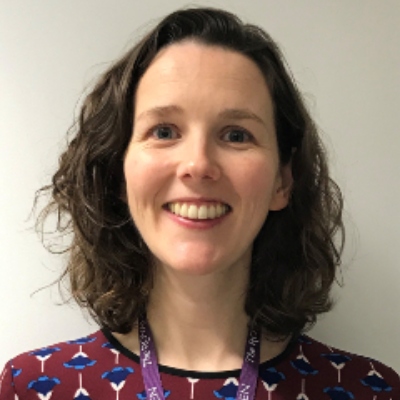RESEARCH: OPTIMISATION OF ADAPTIVE RADIOTHERAPY AND TREATMENT PERSONALISATION.
 What stage of your research career are you currently at, and what are your research interests?
What stage of your research career are you currently at, and what are your research interests?
I am a mid-career researcher, having completed my MSc and other research projects prior to commencing a PhD in 2021. Currently I am in the second year of my PhD with the Institute of Cancer Research, my project is titled ‘Stratifying patients for optimal benefit from novel adaptive radiotherapy and/or personalised preparation’. My research interests include image-guided and adaptive radiotherapy and personalisation of treatment pathways. I am doing my PhD part-time enabling me to continue clinical work.
How did you get into research?
In 2016 I completed my MSc in Oncology Practice; my dissertation project focussed on developing radiographer competency to deliver cervical cancer soft-tissue image guided radiotherapy. This project changed and improved clinical practice. Seeing first-hand how radiographer-led research could positively impact both patient care and radiographer practice had me hooked. Later in 2016 I moved into a role combining research and advanced clinical practice. Within this role I was introduced to the inner workings of radiotherapy trials and had the opportunity to work with and learn from an inspirational multi-disciplinary research active team. This gave me the confidence to apply for my current role as Superintendent Research Radiographer which I started in 2020. In this role I work closely with lead clinicians, research fellows, physicists, and therapeutic radiographers to develop and refine adaptive radiotherapy pathways. I am very lucky to have amazing champions who have encouraged and support me to undertake a PhD within this role.
What do you enjoy about research?
I enjoy many aspects of research; conducting research provides opportunity to ask questions and solve problems. I love that not one workday is the same as the next. I get to collaborate with many different healthcare professionals, with the variety of the roles providing opportunities to develop and broaden my knowledge and skill. The highlight for me is seeing the positive impact research has on radiotherapy practice and patient care.
How has research changed your clinical practice?
Being research-active has given me the confidence to critique and question my clinical practice and given me the skills required to advocate and lead change towards better treatment and services for patients.
What challenges do you face as a researcher?
It can be challenging to ring-fence time for my PhD with the demands of a clinical role. Research can also be a frustrating and slow process, there are days when you feel you have achieved nothing, or the results are not as you hoped. Communicating disappointment with peers, mentors and supervisors is incredibly helpful to help you learn and move on from these challenges.
What difference has your research training and experience made to your career?
A huge difference! My research training has helped me feel more confident to lead research and support other researchers. It has enabled me to follow a career path which is varied, interesting and fulfilling. It has also opened up opportunities to work with national and international multi-disciplinary teams developing radiotherapy best practice.
What advice would you give to any radiographers wanting to get involved in research?
Take advantage of the opportunities available to you; research courses and mentoring are available through UK and European radiotherapy societies. Within your department show interest, ask questions and get involved in clinical audits and service evaluations, these are a great way to develop research skills and build professional relationships.
What has made a difference to progressing your research career?
I have been incredibly fortunate to have multidisciplinary role models who have inspired me since the beginning of my career. Through my MSc and PhD, I have been championed by supervisors who are very giving of their time and expertise, enabling me to learn and grow in a supportive environment.
Why do you think it is so important that radiographers get more involved in research?
Radiographers sit at the interface between patients and technology making us perfectly placed to lead research which directly impacts departmental practice, patient care, and treatment outcomes.
Sophie Alexander, Radiotherapy Research Superintendent Radiographer, The Royal Marsden NHS Foundation Trust, sophie.alexander@rmh.nhs.uk
Useful links
Contact us
The CATO Team and Radiographers Incubator work on a Hybrid model, combining days in the office with days working from home – the best way to reach us is by email.
cato@imperial.ac.uk
radresearch@imperial.ac.uk
+44 (0)20 3313 7397

